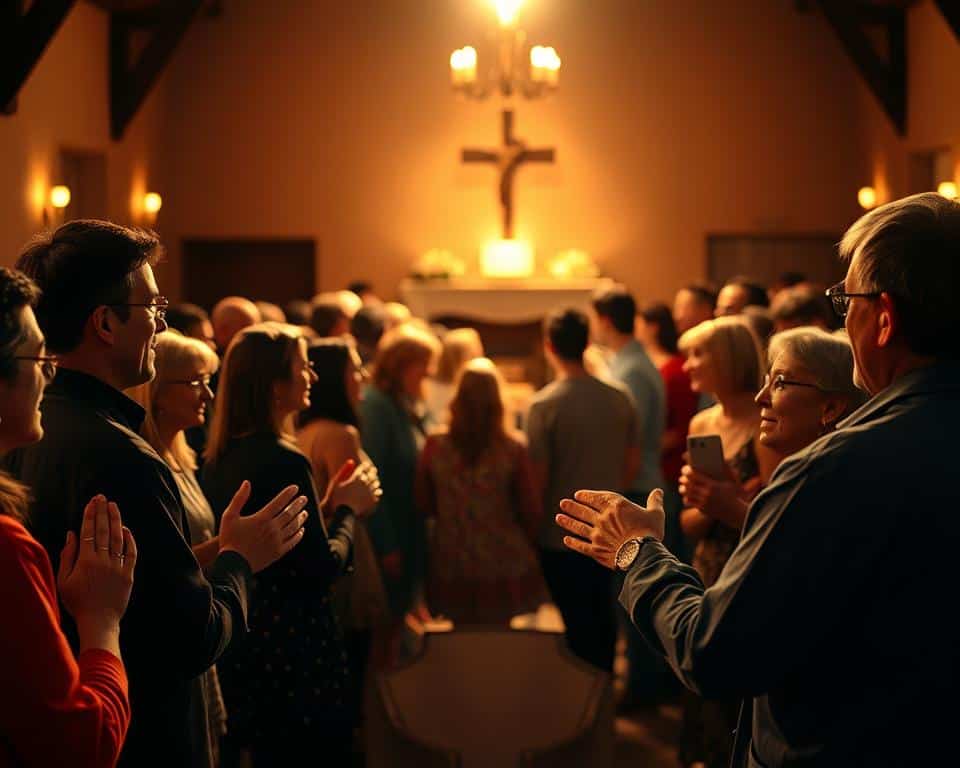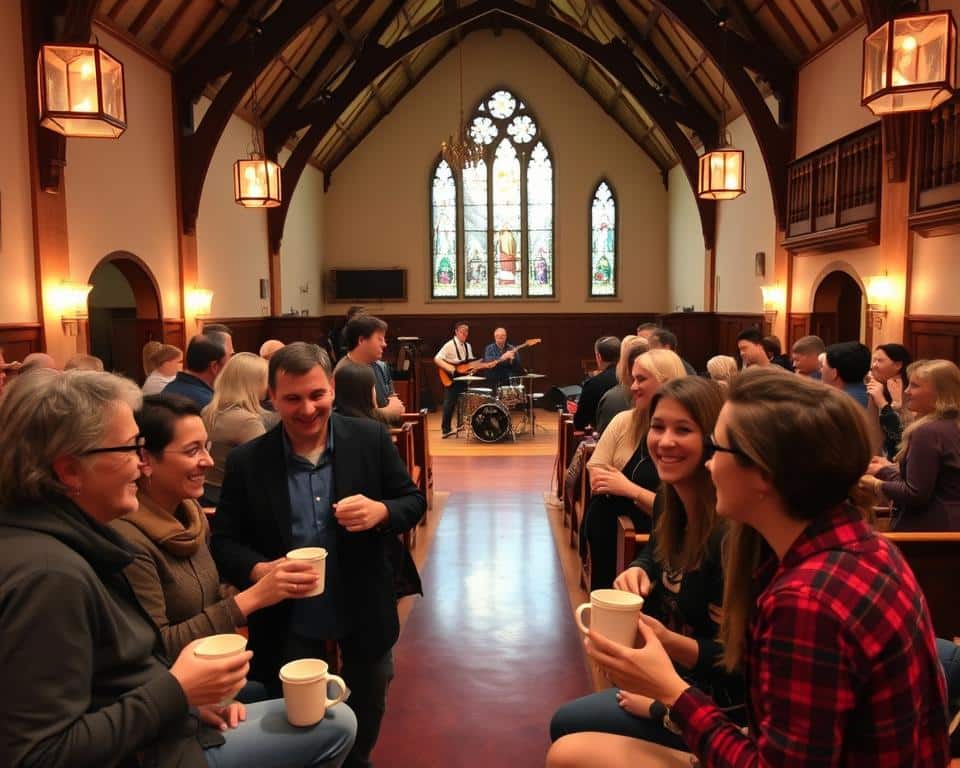Have you ever felt alone in your faith journey? You’re not the only one. Believers thrive when connected to others who share their commitment to God’s word. The early church called this bond koinonia—a deep, purposeful unity in Christ.
Today, distractions and busyness make it easy to drift into isolation. Yet, Scripture reminds us to “make every effort to keep the unity of the Spirit” (Ephesians 4:3). True relationships within a faith community anchor us, offering encouragement and accountability.
Let’s explore how gathering with fellow believers strengthens your walk and reflects Christ’s love.
What Is Church Fellowship?
Biblical fellowship goes beyond coffee chats—it’s about shared purpose. The New Testament calls it koinonia, meaning “shared participation” (1 Corinthians 10:16). Unlike casual gatherings, this bond thrives when believers actively invest in one another’s faith.

Defining Fellowship in Biblical Terms
Early Christians modeled koinonia by sharing resources (Acts 2:44-45). Imagine a potluck: everyone brings a dish, creating a feast. Similarly, true fellowship requires participation—prayer, encouragement, and even material support.
How Fellowship Differs From Social Gatherings
Faith-based connections dig deeper than surface-level talks. Philippians 3:10 shows how shared suffering strengthens bonds. While friendships may fade, truth-centered relationships endure because they’re anchored in Christ.
The Biblical Foundation of Fellowship
God designed faith to flourish in community, not isolation. The New Testament reveals this truth through koinonia—a sacred bond stronger than friendship. Even the Trinity models eternal fellowship: “Our fellowship is with the Father and with his Son” (1 John 1:3).

Koinonia in Action
Paul’s prison letters show fellowship’s power. Chained in Rome, he wrote to believers, “You shared in my sufferings” (Philippians 4:14). Their prayers and gifts turned isolation into victory.
Early Christians took participation further. They sold property to support needy members (Acts 2:45). This wasn’t charity—it was shared ownership in Christ’s mission.
Fellowship That Endures
House churches became hubs for word and worship. Unlike social clubs, these groups faced persecution together. Their bond outlasted Roman threats because it was rooted in truth.
“Let us consider how we may spur one another on toward love and good deeds, not giving up meeting together.”
This command wasn’t optional. Gathering fuels faith. When believers unite, they mirror the New Testament koinonia that changed the world.
How Fellowship Strengthens Faith
You weren’t meant to walk this journey alone. Faith flourishes when believers lock arms, sharing both burdens and breakthroughs. The Bible calls this “mutual exhortation” (Hebrews 3:12-14)—a daily reminder that we’re stronger together.
Encouragement Through Shared Struggles
Jonathan’s visit to David in the wilderness (1 Samuel 23:16) shows how life-giving encouragement works. He didn’t just send a note—he showed up. Vulnerability builds trust, as James 5:16 urges: “Confess your sins to one another and pray for each other.”
Modern examples include prayer chains during crises or small groups studying Scripture. These moments preserve faith by reminding us we’re not alone.
Accountability in Spiritual Growth
Growth requires honesty. Pairing with a trusted believer helps you spot sin’s deceit (Hebrews 3:13). Practical systems include:
- Weekly check-ins: “How’s your time in God’s word?”
- Prayer partnerships: Sharing specific requests.
- Service teams: Living out love together.
Regular meetings fuel perseverance. Hebrews 10:25 isn’t a suggestion—it’s a lifeline. When we gather, we refocus on truth and spur one another onward.
Fellowship as a Tool for Unity
Unity in faith isn’t just a goal—it’s a command from Christ Himself. Scripture declares, “There is neither Jew nor Gentile… for you are all one in Christ” (Galatians 3:28). When believers live this truth, walls of division crumble.
Breaking Down Barriers
Shared missions bridge gaps. A food drive unites retirees and teens. A prayer walk connects cultures. These actions reflect love in motion—not just words.
Conflict? Jesus gave a blueprint: “If your brother sins against you, go and tell him” (Matthew 18:15). Honest conversations heal fractures.
Building Trust Through Presence
Trust grows when we show up. Try these steps:
- Share testimonies: Vulnerability sparks connection.
- Serve together: Paint a widow’s house. Pack meals.
- Celebrate communion: One bread, one body (1 Corinthians 10:17).
“By this everyone will know you are my disciples, if you love one another.”
Your consistent presence speaks louder than sermons. When relationships deepen, unity follows.
The Role of Fellowship in Perseverance
Staying strong in faith requires more than personal effort—it needs connection. Without regular encouragement, even the most devoted believer can drift toward isolation. Scripture warns of a hardened heart as the end result of going it alone (Hebrews 3:12-14).
Preventing Spiritual Isolation
Studies show a 92% retention rate for believers in small groups. Why? Daily exhortation acts like preventative maintenance for faith. Think of it as a spiritual crisis hotline—when struggles come, words of truth and prayer keep despair at bay.
Modern persecution stories reveal a pattern: those isolated falter, while communities endure. Church discipline, when done in love, rescues wandering souls. Like a lifeline, fellowship pulls us back from the edge.
Mutual Exhortation in Action
Hebrews 3:13 urges believers to “encourage one another daily.” This isn’t optional—it’s survival. Here’s how it works:
- Share struggles: Vulnerability breaks isolation’s grip.
- Speak Scripture: God’s words renew the heart.
- Show up: Presence shouts louder than platitudes.
“Let us hold unswervingly to the hope we profess, and never stop meeting together.”
Start today. Reach out to a fellow believer. Your perseverance—and theirs—depends on it.
Practical Ways to Cultivate Fellowship
Meaningful connections in faith don’t happen by accident—they’re built intentionally. Whether through small groups or serving side by side, every believer can work toward deeper bonds. Here’s how to start.
Small Groups and Shared Activities
Small groups turn strangers into family. The early church met in homes, sharing meals and God’s word (Acts 2:46). Follow their example with these steps:
- Launch a group: Invite 5-8 people. Meet weekly to discuss Scripture.
- Share meals: Potlucks foster relaxed conversations.
- Host workshops: Teach skills like prayer journaling or budgeting.
Rotate leadership to give everyone a way to contribute. Consistency matters—set a regular time and stick to it.
Service Projects as Fellowship Opportunities
Ministry unites hearts like nothing else. Jesus modeled this by washing feet (John 13:14-15). Try these ideas:
- Food pantry teams: Pack boxes together. Relationships grow while serving.
- Neighborhood prayer walks: Pray for homes aloud, bonding over shared mission.
- Disaster response: Crisis reveals true unity. Train as a team beforehand.
“Carry each other’s burdens, and in this way you will fulfill the law of Christ.”
Start small. Even simple things—like delivering groceries to a shut-in—build lasting bonds. Your faithfulness today plants seeds for tomorrow’s harvest.
Living Out Fellowship Daily
Faith grows best when shared in everyday moments. Start small—form a morning prayer triplet with two believers. A three-minute call can anchor your life in truth before the day begins.
Bring faith to your workplace. Share a verse during lunch or pray silently for colleagues. These quiet acts plant seeds for years.
Use tech wisely. Video calls let homebound members join Bible studies. Text a prayer prompt to your family or small group. Every moment counts.
Try this challenge: Memorize one “one another” verse this week. Then, initiate a new connection—invite a neighbor to serve at a food pantry. Shared mission builds bonds no distance can break.





